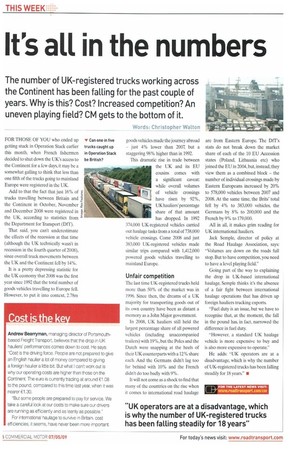It's all in the numbers
Page 16

If you've noticed an error in this article please click here to report it so we can fix it.
The number of UK-registered trucks working across the Continent has been falling for the past couple of years. Why is this? Cost? Increased competition? An uneven playing field? CM gets to the bottom of it.
Words: Christopher Walton
FOR THOSE OF YOU who ended up getting stuck in Operation Stack earlier this month, when French fishermen decided to shut down the UK's access to the Continent for a few days, it may be a somewhat galling to think that less than one fifth of the trucks going to mainland Europe were registered in the UK.
Add to that the fact that just 16% of trucks travelling between Britain and the Continent in October, November and December 2008 were registered in the UK, according to statistics from the Department for Transport (DtT).
That said, you can't underestimate the effects of the recession at that time (although the UK technically wasn't in recession in the fourth quarter of 2008), since overall truck movements between the UK and the Continent fell by 14%.
It is a pretty depressing statistic for the UK economy that 2008 was the first year since 1992 that the total number of goods vehicles travelling to Europe fell. However, to put it into context, 2.78m goods vehicles made the journey abroad — just 4% lower than 2007, but a staggering 98% higher than in 1992.
This dramatic rise in trade between the UK and its EU cousins comes with a significant caveat: while overall volumes of vehicle crossings have risen by 92%, UK hauliers' percentage share of that amount has dropped. In 1992 374,000 UK-registered vehicles carried out haulage tasks from a total of 738,000 vehicle crossings. Come 2008 and just 383,000 UK-registered vehicles made similar trips compared with 1,412,000 powered goods vehicles travelling to mainland Europe.
Unfair competition
The last time UK-registered trucks held more than 50% of the market was in 1996. Since then, the dreams of a UK majority for transporting goods out of its own country have been as distant a memory as a John Major government.
In 2008, UK hauliers still held the largest percentage share of all powered vehicles (including unaccompanied trailers) with 19%, but the Poles and the Dutch were snapping at the heels of their UK counterparts with a 12% share each. And the Germans didn't lag too far behind with 10% and the French didn't do too badly with 9%.
It will not come as a shock to find that many of the countries on the rise when it comes to international road haulage are from Eastern Europe. The DfTS stats do not break down the market share of each of the 10 EU Accession states (Poland, Lithuania etc) who joined the EU in 2004, but, instead, they view them as a combined block — the number of individual crossings made by Eastern Europeans increased by 20% to 578,000 vehicles between 2007 and 2008. At the same time, the Brits' total fell by 4% to 383,000 vehicles, the Germans by 8% to 200,000 and the French by 9% to 179,000.
All in all, it makes grim reading for UK international hauliers.
Jack Semple, director of policy at the Road Haulage Association, says: "Volumes are down on the roads full stop. But to have competition, you need to have a level playing field."
Going part of the way to explaining the drop in UK-based international haulage, Semple thinks it's the absence of a fair fight between international haulage operations that has driven up foreign hauliers trucking exports.
"Fuel duty is an issue, but we have to recognise that, at the moment, the fall in the pound has, in fact, narrowed the difference in fuel duty.
"However, a standard UK haulage vehicle is more expensive to buy and is also more expensive to operate."
He adds: "UK operators are at a disadvantage, which is why the number of UK-registered trucks has been falling steadily for 18 years." •












































































































































